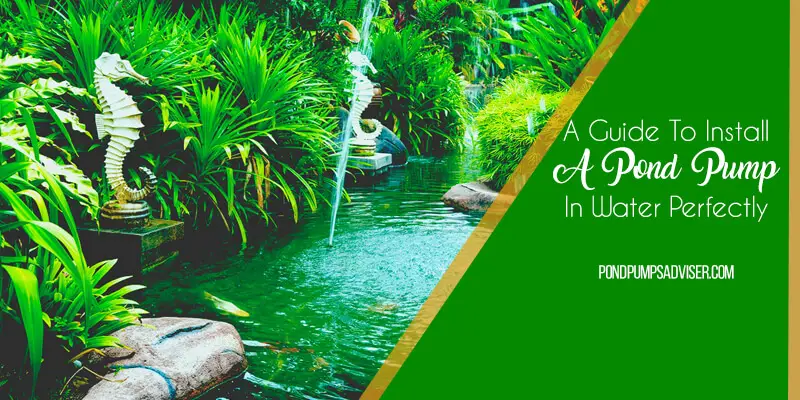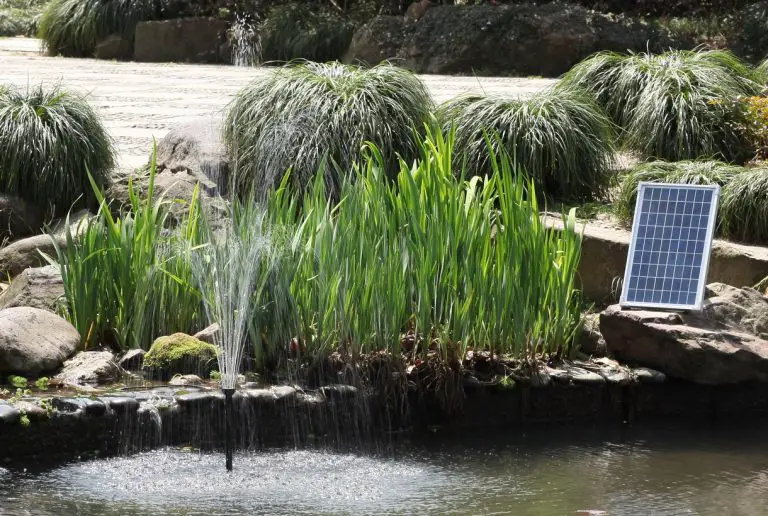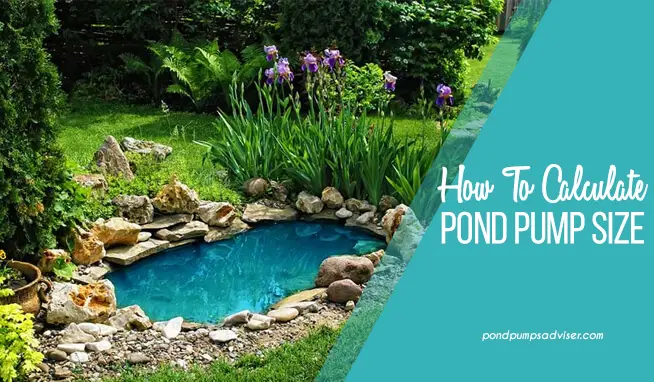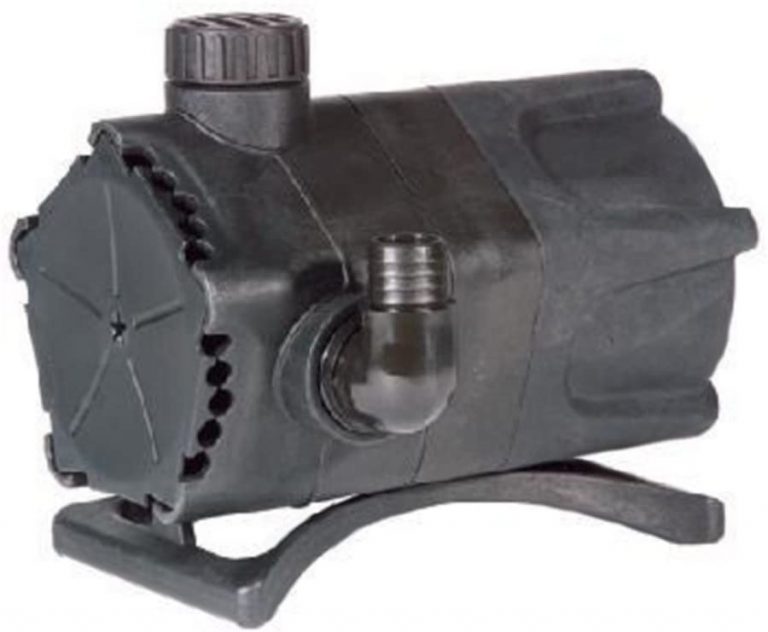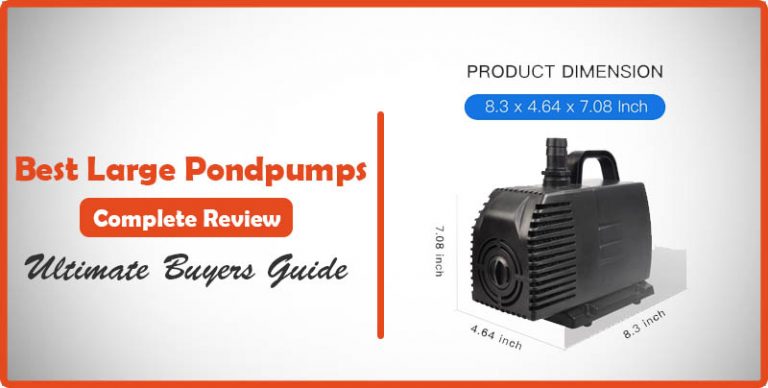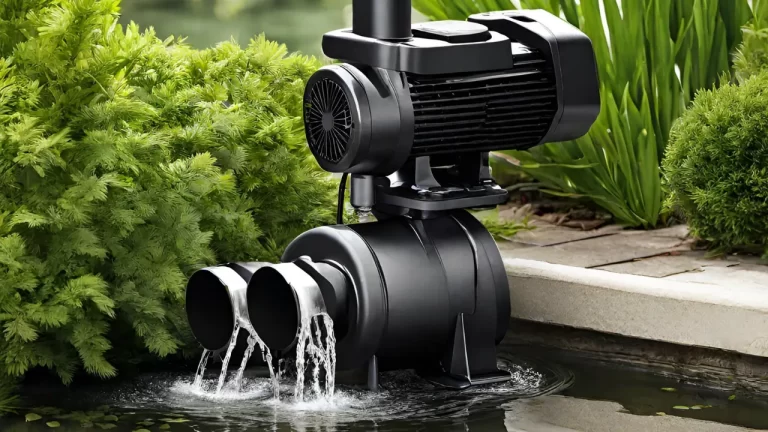A Step by Step Guide to Install Pond Pump in Water
Renami 【Assembled】 Large Filter Cartridge Replacement for Tetra Whisper Bio-Bag Filters Cartridges Large, Disposable Filter Cartridges for Tetra ReptoFilter Cartridges Aquariums - 9 Pack
$23.79 (as of April 20, 2024 00:26 GMT +00:00 - More infoProduct prices and availability are accurate as of the date/time indicated and are subject to change. Any price and availability information displayed on [relevant Amazon Site(s), as applicable] at the time of purchase will apply to the purchase of this product.)In the tranquil corners of gardens, ponds serve as a sanctuary of serenity, bringing a slice of the natural world right into our backyards. A thriving pond is a complex ecosystem, harmonizing between flora and fauna, and at the heart of this vibrant ecosystem lies the pivotal role of a pond pump. Installing a pond pump is not just a step but a significant stride toward fostering a healthy, vibrant aquatic environment.
A pond pump acts as the lifeblood of your pond, facilitating vital water circulation that prevents stagnation and promotes thriving aquatic life. It aids in maintaining the pristine quality of the water, safeguarding your pond from algae outbreaks and unpleasant odors. Moreover, a well-installed pond pump can enhance the aesthetic appeal of your pond, adding a dynamic element that elevates its natural beauty.
In this comprehensive guide, we aim to walk you through the nuanced process of installing a pond pump in water, ensuring that your pond remains a bubbling haven of tranquility and beauty. Whether you are a seasoned pond owner or embarking on your first pond project, this guide is designed to equip you with the knowledge and confidence to undertake this essential task successfully.
As we delve deeper, we will explore the different types of pond pumps available in the market, each catering to specific needs and preferences. Furthermore, we will provide a step-by-step walkthrough of the installation process, peppered with expert tips to help you avoid common pitfalls and achieve a seamless setup.
So, let’s embark on this journey to foster a thriving pond ecosystem, where every ripple resonates with the harmony of nature.
Why is a Pond Pump Essential?
In the world of pond maintenance, the significance of a pond pump cannot be overstated. It serves as the heartbeat of your pond, ensuring a continuous flow of water, which is vital for maintaining a healthy aquatic environment. The circulation facilitated by a pond pump helps in oxygenating the water, a crucial element for the survival of fish and beneficial bacteria residing in your pond.
Moreover, a well-functioning pond pump aids in preventing the growth of algae, which thrives in stagnant water. By fostering water movement, it curtails the breeding ground for mosquitoes, thus maintaining the aesthetic appeal and hygiene of your pond. Additionally, it plays a pivotal role in supporting various water features and filtration systems, enhancing the overall visual and functional aspects of your pond.
Types of Pond Pumps
Choosing the right pond pump is a critical step in setting up a successful pond ecosystem. The market offers a variety of pond pumps, each designed to cater to different needs and preferences. Let’s delve into the distinct types of pond pumps available, helping you make an informed decision:
- Feature Pond Pumps: These pumps are primarily designed to power small water features or pondside ornaments. They are generally low-powered and are an excellent choice for adding a touch of dynamism to your pond. Ideal for powering features like spouting statues or small waterfalls, these pumps add a whimsical touch to your pond setup. Ready to take the next step? Explore our range of feature pond pumps to find the perfect match for your pond setup.
- Fountain Pond Pumps: A popular choice for those looking to add a visual spectacle to their ponds. These pumps are designed to power beautiful fountains, creating a mesmerizing focal point in your garden. They not only add to the visual appeal but also aid in oxygenating the water, promoting a healthy pond environment. You can check more from here.
- Filter Pumps: These are the workhorses of the pond world, efficiently circulating water through filtration systems to maintain clarity and quality. They are capable of handling large particles, making them an essential tool in keeping your pond clean and healthy. You can check more from here.
- High-Pressure Pond Pumps: Suitable for larger water features and pondless waterfalls, these pumps offer a high flow rate, ensuring a spectacular water display. They are also an excellent choice for streams and cascading waterfalls, adding a naturalistic element to your pond. You can check more from here.
- Dry Mounted Pond Pumps: These pumps are installed above ground and cannot be submerged in water. They are typically used in larger ponds and offer the advantage of easy maintenance. Ideal for koi ponds with gravity-fed filtration systems, these pumps ensure a clean and healthy environment for your aquatic friends. You can check more from here.
Our Top 3 Picks
1

CrystalClear PondAir 4
2

High-Pressure Diaphragm Water Pump
3

Submersible Water Pump 6.1ft
Choosing the Right Pond Pump
Before you commence the installation process, it’s crucial to invest in a pond pump that harmonizes seamlessly with your pond’s specific requirements. The ideal pump acts as the linchpin of your pond’s ecosystem, promoting efficient water circulation and nurturing a vibrant aquatic habitat. As you navigate through the selection process, here are some pivotal factors to consider, complemented by our top product recommendations to facilitate your choice:

1
1- FEATURE POND PUMPS – ABOUT 5% OF THE POND PUMP MARKET
9.8
In the niche, yet vibrant segment of pond pumps, the “Feature Pond Pumps” stand as a testament to specialized functionality and aesthetic enhancement. Accounting for about 5% of the pond pump market, these pumps are designed to cater to specific decorative needs, adding a touch of beauty and ambiance to your pond. Ideal for powering pondside ornaments or water features, they are a cost-effective solution to elevate the visual appeal of your pond.
Key Features
- Specialized Functionality: Exclusively designed to service decorative water features and pondside ornaments.
- Aesthetic Enhancement: Adds a beautiful and ambient touch to ponds, enhancing the overall visual appeal.
- Cost-Effective: Offers a budget-friendly solution to incorporate dynamic water features in your pond.
- Low Power Consumption: Operates on low power, making it an energy-efficient choice for small-scale water features.
- Customized Solutions: These can be chosen based on specific pond design needs, allowing for a personalized setup.
What Other Reviewers Say
Based on the reviews and feedback from various users, the Feature Pond Pumps have been appreciated for their specialized functionality and ease of installation. Many users have praised their ability to enhance the beauty of small ponds with minimal investment. However, some users noted that these pumps might not be the best choice for larger ponds or more complex water setups, suggesting a preference for more versatile options for such scenarios.

2
2-FOUNTAIN POND PUMP – ALMOST 25% OF THE POND PUMP MARKET
9.8
The “Fountain Pond Pump” category commands a significant portion of the pond pump market, with nearly a quarter of the market share. These pumps are a popular choice for individuals looking to add a visually pleasing element to their ponds. Primarily serving as a decorative feature, these pumps are instrumental in creating captivating water displays that can transform any pond into a tranquil oasis.
Key Features
- Decorative Enhancement: Primarily used to create visually appealing water displays in ponds.
- Dual Functionality: Comes with T-pieces that can split the flow into a two-tier system, directing water to both the waterfall and the fountain.
- High-Speed Water Flow: Capable of propelling water at speeds of about 1000 mph, creating dynamic and lively water features.
- Popular Choice: This holds a significant share of the market, indicating its popularity for fountain installations.
- Temporary Filtration Capability: This can function as a temporary filter, although it is primarily designed for decorative purposes.
What Other Reviewers Say
The Fountain Pond Pump has garnered praise for its ability to transform ponds into picturesque settings with its dynamic water displays. Users appreciate its dual functionality, which allows for the creation of both fountains and waterfalls. However, some reviewers have noted that its filtration capability is somewhat limited, as it cannot filter out smaller particles effectively. This has led to suggestions of using it primarily for decorative purposes, rather than as a long-term filtration solution.

3
3- High-Pressure Diaphragm Water Pump
9.8
Dominating a significant portion of the pump market, “Filter Pumps” are the unsung heroes in maintaining the pristine quality of pond waters. These pumps are indispensable, serving as the primary engine that ensures the continuous circulation and filtration of water in the pond. Their high market share is a testament to their critical role in fostering a healthy and clean pond environment, making them a staple in pond maintenance and care.
Key Features
- Predominant Usage for Filtration: Primarily used to filter out impurities and maintain water quality in ponds.
- High Efficiency: Offers high efficiency in filtering even large particles with minimal effort.
- Continuous Operation: Designed to operate continuously for years, ensuring the longevity of your pond’s ecosystem.
- Eco-Friendly Options: Now available in eco-friendly variants that consume less energy, reducing the environmental impact.
- Dual Inlet Feature: Some models come with a second inlet feature, allowing them to draw water from multiple reservoirs, enhancing their functionality.
What Other Reviewers Say
The Filter Pumps have been lauded by many users for their efficiency and critical role in maintaining pond water quality. Users appreciate their long-lasting nature, capable of running continuously for years without significant issues. The eco-friendly variants have also been praised for their reduced energy consumption. However, some users have noted the potential for increased electricity bills with continuous use, suggesting a preference for eco-friendly models to mitigate this issue.

4
4-HIGH-PRESSURE POND PUMPS – HOLD ABOUT 5% OF THE MARKET SHARE
9.8
In the specialized segment of the pond pump market, the “High-Pressure Pond Pumps” carve out a niche for themselves, holding about 5% of the market share. These pumps are the go-to choice for applications requiring high pressure, making them an ideal choice for waterfalls and long-distance water delivery systems. Not only do they offer high flow rates, but they also come equipped with features that ensure efficient operation even in shallow water conditions.
Key Features
- High-Pressure Applications: Specifically designed to cater to applications requiring high pressure, such as waterfalls and long-distance water delivery.
- Float Switch: Equipped with a float switch that automatically turns off the pump when water levels become shallow, preventing damage.
- High Flow Rate: Capable of generating high flow rates, which only drop when faced with greater head heights.
- Cost-Effective: Offers high functionality at a relatively low cost, making it a budget-friendly option for specialized pond setups.
- Continuous Operation: Designed for continuous operation, with the ability to automatically shut off after completing their cycle to prevent damage.
What Other Reviewers Say
The High-Pressure Pond Pumps have been well-received by users for their specialized functionality and high flow rates. Many reviewers appreciate the automatic shut-off feature, which prevents damage in shallow water conditions. The pump’s ability to facilitate dynamic water features like pondless waterfalls has also been highlighted positively. However, some users caution against potential overuse, advising careful monitoring to prevent damage and ensure longevity.

5
5- DRY-MOUNTED POND PUMPS – ALSO OWN ABOUT 5% OF MARKET SHARE
9.8
Dry Mounted Pond Pumps, holding about 5% of the market share, are a unique category of pond pumps designed for above-water installation. These pumps are particularly favored in specific pond configurations, offering distinct advantages that make them a preferred choice for koi pond setups. As a pond owner, embracing the responsibility of providing a clean and healthy environment for the aquatic life in your pond is paramount, and these pumps can be a vital tool in achieving this goal.
Key Features
- Above-Water Installation: Specifically designed to be installed above the water level, making them suitable for certain pond configurations.
- Ease of Use: Offers more straightforward handling compared to submersible pumps, allowing for easy hose attachment without the need for underwater installation.
- Ideal for Koi Ponds: Particularly popular among koi keepers, facilitating gravity-fed filtration systems commonly found in koi ponds.
- Responsible Pond Management: Encourages pond owners to take responsibility for the health and well-being of the aquatic life in their ponds by facilitating clean and tidy environments.
- Crystal Clear Oasis: Aids in maintaining a clear and clean pond, enhancing the aesthetic appeal of your backyard.
What Other Reviewers Say
Reviewers have highlighted the ease of use and maintenance as standout features of the Dry Mounted Pond Pumps. Many appreciate their suitability for koi ponds, noting their effectiveness in facilitating gravity-fed filtration systems. The pumps have been praised for encouraging responsible pond management and helping owners maintain a clean and healthy environment for their fish. However, some reviewers have pointed out their limited versatility, noting that they are not suitable for all pond configurations due to their inability to be submerged.
Gathering Necessary Tools and Accessories
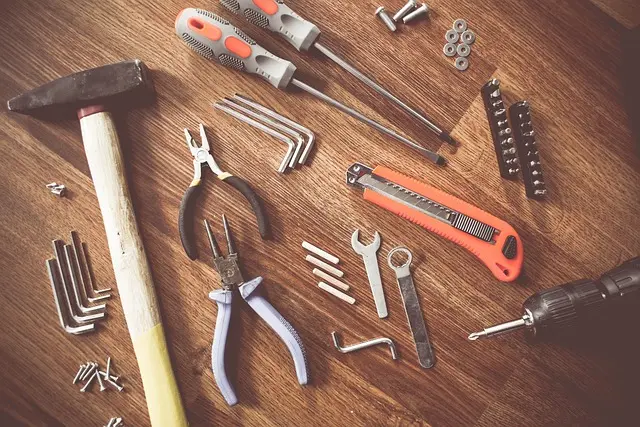
Once you’ve selected the right pond pump, it’s time to gather the necessary tools and accessories for a smooth installation process. Here’s a list of items you might need:
- Tubing: Depending on the type of pump, you’ll need appropriate tubing to facilitate water flow. Ensure that the tubing size matches the pump’s outlet size for a seamless connection.
- Elevation Units: To prevent the pump from sitting directly on the pond floor, consider using elevation units like cinder blocks or specially designed pump stands.
- Electrical Setup: Ensure easy access to a power outlet with proper safety measures in place, including a Ground Fault Circuit Interrupter (GFCI) to prevent electrical hazards.
- Installation Kit: Some pumps come with installation kits that include essential accessories like connectors and hose clamps. If not, make sure to purchase these separately.
- Instruction Manual: Keep the pump’s instruction manual handy for reference during the installation process.
Step-by-Step Installation Guide
Selecting the Ideal Location for the Pump
Choosing the right location for your pond pump is a critical step that can significantly influence its efficiency and lifespan. Here are some tips to help you select the ideal spot:
- Proximity to Electrical Outlet: Ensure that the chosen location is near a power source to avoid the hassle of extending electrical lines, which can be both unsafe and unsightly.
- Away from Debris Source: Try to place the pump away from areas where it might suck in debris such as leaves or twigs, which can clog the pump and hinder its performance.
- Easy Accessibility: Choose a location that allows easy access for maintenance and cleaning, without disturbing the pond’s ecosystem.
Setting Up the Pump
Setting up the pump correctly is vital to ensure its optimal performance and longevity. Follow these steps for a successful setup:
- Prepping the Pond: Before installing the pump, clean the pond to remove any debris that might clog the pump. Consider placing the pump on an elevation unit to prevent direct contact with the pond floor, which can increase its lifespan.
- Installing the Tubing: Attach the appropriate tubing to the pump, ensuring a secure connection to facilitate smooth water flow. Depending on your setup, you might need to install additional accessories like connectors or hose clamps.
- Creating Water Movement: Now, it’s time to create that mesmerizing water movement in your pond. Whether you’re setting up a fountain or a waterfall, ensure that the hose is properly secured and positioned to create the desired water flow. Test the setup by plugging in the pump and adjusting the flow rate as necessary.
Post-Installation Care
Maintenance Tips
Installing a pond pump is just the beginning of your journey towards a vibrant pond ecosystem. Regular maintenance is key to ensuring that your pump operates at its peak efficiency, providing a healthy and beautiful environment for your pond. Here are some maintenance tips to keep in mind:
- Regular Cleaning: Over time, the pump can accumulate debris and dirt, which can hinder its performance. Schedule regular cleaning sessions to remove any buildup and ensure smooth operation.
- Checking for Leaks and Cracks: Periodically inspect the pump and the surrounding areas for any signs of leaks or cracks. Early detection can prevent more significant issues down the line.
- Winter Care: If you live in an area with harsh winters, consider removing the pump during the cold months to prevent damage due to freezing temperatures.
- Professional Inspection: Depending on the complexity of your pond setup, you might consider having a professional inspection annually to ensure that all components are functioning correctly.
- Energy Efficiency: Monitor the energy consumption of your pump and consider upgrades or adjustments to maintain high energy efficiency, which is both cost-effective and environmentally friendly.
Frequently Asked Questions
Conclusion
Embarking on the journey of installing a pond pump is a rewarding endeavor, paving the way for a vibrant and thriving aquatic sanctuary right in your backyard. A well-installed pond pump not only enhances the aesthetic appeal of your pond but also fosters a healthy ecosystem, where flora and fauna flourish in harmony.
As you stand back and admire the bubbling haven of tranquility you’ve created, remember that this guide stands as a testament to your efforts in nurturing a slice of nature at home. The gentle ripple of water and the mesmerizing sight of a fountain or waterfall are now testimonies to your dedication and hard work.
We hope this comprehensive guide has equipped you with the knowledge and confidence to undertake this essential task successfully. Remember, the journey doesn’t end with the installation. Regular maintenance and care are key to enjoying a pond that resonates with the harmony of nature, offering a tranquil retreat for years to come.
Buying Guide
Quality and Durability
Material: Opt for pumps made from high-quality materials that can withstand the test of time and harsh weather conditions.
Warranty: Consider products that come with a warranty, ensuring peace of mind in case of any malfunctions.
Features and Specifications
Flow Rate: Depending on the size of your pond and the type of water features you have, choose a pump with an appropriate flow rate.Energy Efficiency: Look for pumps that offer high energy efficiency to reduce operational costs and environmental impact.
Brand Reputation
Reviews and Ratings: Before making a purchase, check reviews and ratings to gauge the experiences of other users.
Customer Support: Opt for brands that offer excellent customer support to assist you in case of any issues or queries.
Accessories and Add-Ons
Tubing and Connectors: Ensure that you have the necessary accessories like tubing and connectors for a seamless installation.
Cleaning and Maintenance Kits: Consider purchasing kits that include essential tools for cleaning and maintaining your pump.
Budget
Cost-Effectiveness: While it’s tempting to go for cheaper options, remember that quality should not be compromised. Choose a product that offers the best value for your money.
